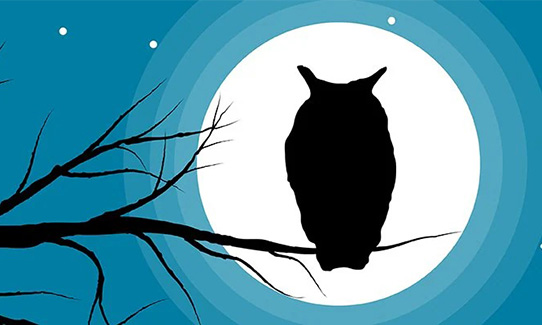

Jun 02 2022
‘Night Owl’ Teens Caught Between Biology & Schedules


Summary
Help your teenager prioritize sleep to improve their daily mood, energy level, performance and overall health for the remainder of their life.
Teenagers are often characterized as rebellious night owls with raging hormones who reluctantly stumble from bed each morning to prepare for their day.
While this description is widely accepted, the root cause of this maddening behavior is not commonly known. As teens grow and develop into adulthood, they experience a natural shift in their body’s internal clock, known as circadian rhythm. The shift delays the production of melatonin, the hormone that promotes sleep. As a result, adolescents do not begin feeling tired until later in the evening, making it difficult for them to fall asleep before 11 p.m.
Many teenagers would gladly sleep from 11 p.m. until 8 or 9 a.m., which would give them the eight to 10 hours of rest they need during puberty, but school start times and other demands don’t allow for that. Add increasing academic demands, extracurricular practices, family obligations, personal electronics and jobs, and teens’ sleep schedules are squeezed at both ends.
As a result, most teens are significantly sleep deprived. This lack of sleep can affect the development of the frontal lobe of the brain, an area critical to controlling impulsive behaviors. Sleep deprivation can also reduce alertness and attentiveness causing delayed reaction times, hinder decision-making skills and greatly impair the ability to drive, making teenagers at higher risk for motor vehicle accidents.
Teens who do not sleep properly are more likely to have increased irritability, mood swings, lack of concentration, decreased motivation and a potential decline of academic and/or athletic performance. According to recent research, students who report getting C’s, D’s and F’s in school also report going to bed about 40 minutes later and getting about 25 minutes less sleep than those who report getting A’s and B’s.
Getting less sleep also puts teens at risk for high blood pressure, abnormal blood lipids, depression, suicide, overweight/obesity, diabetes and long-term cardiovascular problems. Sleep difficulties are associated with bipolar disorder and attention deficit hyperactivity disorder (ADHD) in teens.
A well-slept brain can process and retain information better and make learning and studying easier. Quality sleep works behind the scenes to strengthen the immune system, help muscles recover from activity, regulate hormones and improve concentration, behavior, memory, mood and overall health.
Some simple ways to help your adolescent receive the amount of sleep needed is to help them:
• Budget a minimum of eight hours for sleep.
• Create a consistent bedtime routine incorporating time for relaxation.
• Avoid caffeine – especially in the afternoon and evening.
• Keep bedroom cool, dark and quiet.
• Go to bed and get up at the same time, even on weekends and when not in school.
• Put away electronics.
The blue light emitted by screens tricks the brain into thinking it is daytime, so the body slows the production of the hormone melatonin, making it even harder to fall asleep. Switch electronic devices to silent mode, turn off notifications and put the device away at least 30 minutes to one hour prior to bedtime to help prevent sleep interruptions throughout the night.
Parents may want to consider tying sufficient sleep schedules to driving privileges. Insufficient sleep = no keys. This helps to prevent teens from driving drowsy and putting themselves and others at risk.
Help your teenager prioritize sleep to improve their daily mood, energy level, performance and overall health for the remainder of their life.
If your teenager is experiencing sleep difficulties or a potential sleep disorder, talk with your primary care provider and see if a sleep medicine consultation may be appropriate.
Help your teenager prioritize sleep to improve their daily mood, energy level, performance and overall health for the remainder of their life.


Tracy Hamilton, CCSH, RRT-SDS, RPSGT, RST
Tracy Hamilton, CCSH, RRT-SDS, RPSGT, RST, is a sleep navigator with North Mississippi Medical Center’s Sleep Disorders Center. Tracy is certified in Clinical Sleep Health and is a Registered Respiratory Therapist with additional sleep disorders specialties. After five years of prior respiratory and sleep experience, Tracy joined NMMC in 2001.
NMMC's Sleep Disorders Centers help people overcome sleep apnea, narcolepsy, chronic insomnia and other sleep disorders.

Subscribe to Our Newsletter
Like this content and want to get more? Sign up for True North, the health and wellness newsletter from North Mississippi Health Services!

Subscribe to Our Newsletter
Like this content and want to get more? Sign up for True North, the health and wellness newsletter from North Mississippi Health Services!

Nurse Link®
Not sure if you need Urgent Care or the ER? Call 1-800-882-6274 anytime to speak directly to a registered nurse and get immediate answers. Using computerized medical protocols, nurses direct callers to the most appropriate treatment. Our nurses are available 24 hours per day, seven days per week.